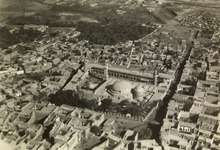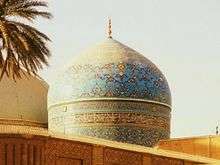Abdul Qadir Gilani
| ʿAbd al-Qādir al-Jīlānī | |
|---|---|
| Venerated in | All of Sunni Islam, but particularly in the Hanbali school (Salafi Sunnis honor rather than venerate him). |
| Major shrine | Mausoleum of Abdul-Qadir Gilani, Baghdad, Iraq |
| Major works |
al-Ḡonya le ṭālebī ṭarīq al-ḥaqq Fotūḥ al-ḡayb |
| ʿAbd al-Qādir al-Gīlānī عبدالقادر الجيلاني | |
|---|---|
 ʿAbd al-Qādir al-Gīlānī in Arabic calligraphy. | |
| Title | Shaykh al-Islam |
| Born |
17 March 1078 CE (1 Ramadan, 470 AH) Gilan Province, present-day Iran |
| Died |
21 February 1166 CE (11 Rabi' al-Thani, 561 AH) Baghdad, Iraq |
| Resting place | Baghdad, Iraq |
| Era | Islamic Golden Age |
| Region | Baghdad |
| Religion | Islam |
| Denomination | Sunni |
| Jurisprudence | Hanbali[1][2] |
| Creed | Traditionalist (Athari) |
| Main interest(s) | Fiqh, Sufism, aqidah |
| Tariqa | Qadiriyya (founder) |
ʿAbd al-Qādir Gīlānī, (Persian: عبدالقادر گیلانی, formally Muḥyī l-Dīn Abū Muḥammad b. Abū Sālih ʿAbd al-Qādir al-Gīlānī al-Ḥasanī wa'l-Ḥusaynī (Arabic: عبدالقادر الجيلاني, Turkish: Abdülkâdir Geylânî, Kurdish: Evdilqadirê Geylanî, Sorani Kurdish: عهبدوالقادری گهیلانی),[3] known as for short was a Hanbali Sunni Muslim preacher, orator, ascetic, mystic, sayyid, faqīh, and theologian[3] who was known for being the eponymous founder of the Qadiriyya tariqa (Sufi order) of Sufism.[3]
Born 29 Sha'ban 470 AH (around 1077) in the town of Na'if, district of Gilan-e Gharb, Gilan, Iran[4][nb 1][5] and died Monday, February 14, 1166 (11 Rabi' al-Thani 561 AH), in Baghdad,[6] (1077–1166 CE), was a Persian[4] Hanbali Sunni[1][2] jurist and sufi based in Baghdad. The Qadiriyya tariqa is named after him.[7]
Name
Gilani is granted the title Sayyid to indicate his descent from Muhammad.[8] The name Muhiyudin describes him as a "reviver of religion".[9] Gilan (Arabic al-Jilani) refers to his place of birth, Gilan.[10][11] However, Gilani also carried the epithet Baghdadi.[12][13][14] referring to his residence and burial in Baghdad. He is also called al-Hasani wa'l-Husayni, which indicates a claim to lineal descent from both Hasan ibn Ali and Husayn ibn Ali, the sons of Ali and grandsons of Muhammad.[15][16]
Paternal heritage
Gilani's father was from Sayyid lineage.[17][18] He was respected as a saint by the people of his day, and was known as Jangi Dost "who loves God", thus "Jangidost" was his sobriquet.[19][20][21]
Education
Gilani spent his early life in Gilan, the town of his birth. In 1095, at the age of eighteen years, he went to Baghdad. There, he pursued the study of Hanbali law [22] under Abu Saeed Mubarak Makhzoomi and ibn Aqil.[23] He was given lessons on Hadith by Abu Muhammad Ja'far al-Sarraj.[23] His Sufi spiritual instructor was Abu'l-Khair Hammad ibn Muslim al-Dabbas.[24] (A detailed description of his various teachers and subjects are included below). After completing his education, Gilani left Baghdad. He spent twenty-five years as a reclusive wanderer in the desert regions of Iraq.[25]
Education in Baghdad
At the age of 18, Gilani went to Baghdad to study the Hanbali school of fiqh.
| Subject | Shaykh (Teacher) |
|---|---|
| Fiqh (Islamic Jurisprudence) | Ibn Aqil |
| Fiqh (Islamic Jurisprudence) | Abu Al Hasan Muhammad ibn Qazi Abu Yali |
| Fiqh (Islamic Jurisprudence) | Abu Al Khatab Mahfuz Hanbali |
| Fiqh (Islamic Jurisprudence) | Muhammad ibn Al Husnayn |
| Fiqh (Islamic Jurisprudence) | Abu Saeed Mubarak Makhzoomi |
| Tasawwuf (Sufism) | Abu Saeed Mubarak Makhzoomi
Abu'l-Khair Hammad ibn Muslim al-Dabbas Abu Zakariay ibn Yahya ibn Ali Al Tabrezi |
| Hadith | Abu Bakr ibn Muzaffar |
| Hadith | Muhammad Ibn Al Hasan Baqalai Abu Sayeed
Muhammad ibn Abdul Kareem |
| Hadith | Abu Al Ghanaem Muhammad Ibn Muhammad Ali Ibn Maymoon Al Farsi |
| Hadith | Abu Bakr Ahmad Ibn Al Muzaffar |
| Hadith | Abu Jafer Ibn Ahmad Ibn Al Hussain Al Qari |
| Hadith | Abu Al Qasim Ali Ibn Muhammad Ibn Banaan Al Karkhi |
| Hadith | Abu Talib Abdul Qadri Ibn Muhammad Yusuf |
| Hadith | Abdul Rahman Ibn Ahmad Abu Al Barkat Hibtaallah Ibn Al Mubarak |
| Hadith | Abu Al Nasr Ibn Il Mukhtar |
| Hadith | Abu Nasr Muhammad |
| Hadith | Abu Ghalib Ahmad |
| Hadith | Abu Abdullah Aulad Ali Al Bana |
| Hadith | Abu Al Hasan Al Mubarak Ibn Al Teyvari |
| Hadith | Abu Mansur Abdurahman Al Taqrar |
Later life
In 1127, Gilani returned to Baghdad and began to preach to the public.[5] He joined the teaching staff of the school belonging to his own teacher, al-Mazkhzoomi, and was popular with students. In the morning he taught hadith and tafsir, and in the afternoon he held discourse on the science of the heart and the virtues of the Quran. He was said to have been a convincing preacher and converted numerous Jews and Christians. His strength came in the reconciling of the mystical nature of Sufism and strict nature of the Quran.[5]
Death and burial

Gilani died in the evening of Tuesday, February 21, 1166 (11th Rabi' al-thani 561 AH) at the age of ninety one years according to the Islamic calendar.[6] His body was entombed in a shrine within his madrasa in Babul-Sheikh, Rusafa on the east bank of the Tigris in Baghdad, Iraq.[27][28][29] During the reign of the Safavid Shah Ismail I, Gilani's shrine was destroyed.[30] However, in 1535, the Ottoman Sultan Suleiman the Magnificent had a turba (dome) built over the shrine, which exists to this day.[31]
Birthday & Death Anniversary celebration
1 Ramadan is celebrated as the birthday of Abdul Qadir Gilani while the death anniversary is on 11 Rabi us Thani. The later is called in the Subcontinent as Giyarwee Shareef or Honoured Day of 11th.[32]

Books
- Kitab Sirr al-Asrar wa Mazhar al-Anwar[33] (The Book of the Secret of Secrets and the Manifestation of Light)
See also
Bibliography
- Sayings of Shaikh Abd al-Qadir al-Jīlānī Malfūzāt, Holland, Muhtar (translator). S. Abdul Majeed & Co, Kuala Lumpur (1994) ISBN 1-882216-03-2.
- Fifteen letters, khamsata ashara maktūban / Shaikh Abd Al-Qādir Al-Jīlānī. Translated from Persian to Arabic by Alī usāmu ́D-Dīn Al-Muttaqī. Translated from Arabic into English by Muhtar Holland.
- Kamsata ašara maktūban. First edition. ʿAlāʾ al-Dīn, ʿAlī B., ʿAbd al-Malik al- Muttaqī al-Hindī (about 1480–1567) and Muhtar Holland (1935–). Al-Baz publications, Hollywood, Florida. (1997) ISBN 1-882216-16-4.
- Jalā Al-Khawātir: a collection of forty-five discourses of Shaikh Abd Al-Qādir Al-Jīlānī, the removal of cares. Chapter 23, pg 308. Jalā al-Khawātir, Holland, Muhtar (1935–) (translator). Al-Baz publications, Fort Lauderdale, Florida. (1997) ISBN 1-882216-13-X.
- The sultan of the saints: mystical life and teachings of Shaikh Syed Abdul Qadir Jilani / Muhammad Riaz Qadiri Qadiri, Muhammad Riyaz. Gujranwala, Abbasi publications. (2000) ISBN 969-8510-16-8.
- The sublime revelation: al-Fath ar-Rabbānī, a collection of sixty-two discourses / Abd al-Qādir al- Jīlānī, Second edition. al-Rabbānī, al-Fath. Al-Baz publications, Fort Lauderdale, Florida. (1998). ISBN 1-882216-02-4.
- Al-Ghunya li-talibi tariq al-haqq wa al-din, (Sufficient provision for seekers of the path of truth and religion), Parts one and two in Arabic. Al-Qadir, Abd, Al-Gaylani. Dar Al-Hurya, Baghdad, Iraq, (1988).
- Al-Ghunya li-talibi tariq al-haqq wa al-din, (Sufficient provision for seekers of the path of truth and religion.) in Arabic. Introduced by Al-Kilani, Majid Irsan. Dar Al-Khair, Damascus, Bairut, (2005).
- Encyclopædia Iranica, Bibliotheca Persica PresS, ISBN 1-56859-050-4.
Notes
- ↑ There is uncertainty as to the year of his birth; some sources say 1077, others 1078.
References
- 1 2 John Renard, The A to Z of Sufism. p 142. ISBN 081086343X
- 1 2 Juan Eduardo Campo, Encyclopedia of Islam, p. 288. ISBN 1438126964
- 1 2 3 Abdul Qadir Gilani at Encyclopædia Iranica
- 1 2 W. Braune, Abd al-Kadir al-Djilani, The Encyclopaedia of Islam, Vol. I, ed. H.A.R Gibb, J.H.Kramers, E. Levi-Provencal, J. Schacht, (Brill, 1986), 69;".. all authorities are unanimous in stating that he was a Persian from Nayf (Nif) in Djilan, south of the Caspian Sea."
- 1 2 3 'Abd al-Qadir al-Jilani at Encyclopædia Britannica
- 1 2 The works of Shaykh Umar Eli of Somalia of al-Tariqat al-Qadiriyyah.
- ↑ "Sufism, Sufis, and Sufi Orders: Sufism's Many Paths". islam.uga.edu. Retrieved 2017-07-21.
- ↑ Abun-Nasr, Jamil M. (2007-01-01). Muslim Communities of Grace: The Sufi Brotherhoods in Islamic Religious Life. Columbia University Press. p. 94. ISBN 9780231143301.
- ↑ Mihr-e-munīr: biography of Hadrat Syed Pīr Meher Alī Shāh pg 21, Muhammad Fādil Khān, Faid Ahmad. Sajjadah Nashinan of Golra Sharif, Islamabad (1998).
- ↑ Encyclopaedia of religion and ethics: volume 1. (A – Art). Part 1. (A – Algonquins) pg 10. Hastings, James and Selbie, John A. Adamant Media corporation. (2001), "and he was probably of Persian origin."
- ↑ The Sufi orders in Islam, 2nd edition, pg 32. Triingham, J. Spencer and Voll, John O. Oxford University Press US, (1998), "The Hanafi Qadirriya is also included since 'Abd al-Qadir, of Persian origin was contemporary of the other two."
- ↑ Devotional Islam and politics in British India: Ahmad Riza Khan Barelwi and his movement, 1870–1920, pg 144, Sanyal, Usha Oxford University Press US, 19 August 1999. ISBN 0-19-564862-5 ISBN 978-0-19-564862-1.
- ↑ Cultural and religious heritage of India: Islam pg 321. Sharma, Suresh K. (2004)
- ↑ Indo-iranica pg 7. The Iran Society, Calcutta, India. (1985).
- ↑ Biographical encyclopaedia of sufis: central asia and middle east, pg 123, Vol 2. Hanif N. Sarup and Sons. (2002) ISBN 81-7625-266-2, 9788176252669.
- ↑ The Election of Caliph/Khalifah and World Peace pg 176. Mowla, Khondakar G. (1998).
- ↑ Historical and political who's who of Afghanistan. p 177. Adamec, Ludwig W. (1975)
- ↑ Qādrī, Muḥammad Riyāz̤ (2000-01-01). The Sultan of the Saints: Mystical Life and Teaching of Shaikh Syed Abdul Qadir Jilani. Abbasi Pablications. p. 19. ISBN 9789698510169.
- ↑ "Sulook organisation website" (PDF). Archived from the original (PDF) on 2011-07-28. Retrieved 2010-02-19.
- ↑ Mihr-e-munīr: biography of Hadrat Syed Pīr Meher Alī Shāh pg 27, Khān, Muhammad Fādil and Ahmad, Faid. Sajjadah Nashinan of Golra Sharif, Islamabad. (1997)
- ↑ Encyclopaedia of Sufism, volume 1, Kahn, Masood Ali and Ram, S.
- ↑ Campo, Juan Eduardo (2009-01-01). Encyclopedia of Islam. Infobase Publishing. p. 4. ISBN 9781438126968.
- 1 2 Gibb, H.A.R.; Kramers, J.H.; Levi-Provencal, E.; Schacht, J. (1986) [1st. pub. 1960]. Encyclopaedia of Islam (New Edition). Volume I (A-B). Leiden, Netherlands: Brill. p. 69. ISBN 9004081143.
- ↑ Malise Ruthven, Islam in the World, p 243. ISBN 0195305035
- ↑ Esposito J. L. The Oxford dictionary of Islam. p160. ISBN 0199757267
- ↑ Akbar, pg.11 Al Haqq, Abd. and Ghunyat al-talibeen (Wealth for Seekers) pg. 12 Urdu version
- ↑ Al-Ghunya li-talibi tariq al-haqq wa al-din (Sufficient provision for seekers of the path of truth and religion), parts one and two in Arabic, Al-Qadir, Abd and Al-Gilani. Dar Al-Hurya, Baghdad, Iraq, (1988).
- ↑ Al-Ghunya li-talibi tariq al-haqq wa al-din (Sufficient provision for seekers of the path of truth and religion) with introduction by Al-Kilani, Majid Irsan. Al-Kilani, Majid, al-Tariqat, 'Ursan, and al-Qadiriyah, Nash'at
- ↑ "The Qadirya Mausoleum" (PDF).
- ↑ A.A. Duri, Baghdad, The Encyclopaedia of Islam, Vol. I, 903.
- ↑ W. Braune, Abd al-Kadir al-Djilani, The Encyclopaedia of Islam, Vol. I, 70.
- ↑ "Ghousia".
- ↑ "Sirr-ul-Asrar". www.nafseislam.com. Retrieved 2016-08-04.
External links
- Revelations of the Unseen Translation of Futuh al-Ghaib, at archive.org.
- Sufficient Provision For Seekers Of The Path Of Truth Translation of parts of Al-Ghunya Li Talibi Tariq Al-Haqq, at archive.org.
- Openings from the Lord Translation of excerpts from Al-Fath Al-Rabbani, at archive.org.
- Utterances Translation of Malfuzat, at archive.org.